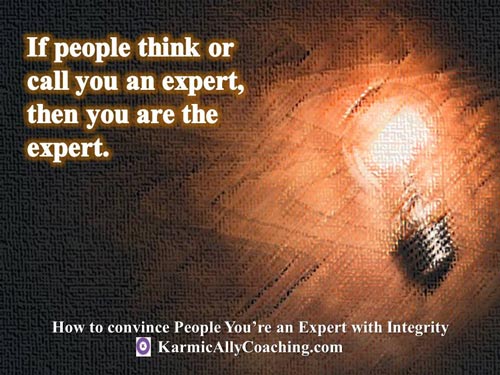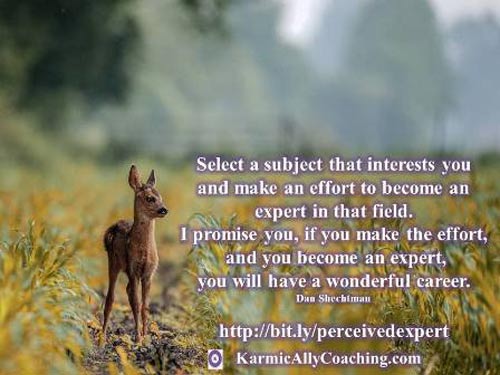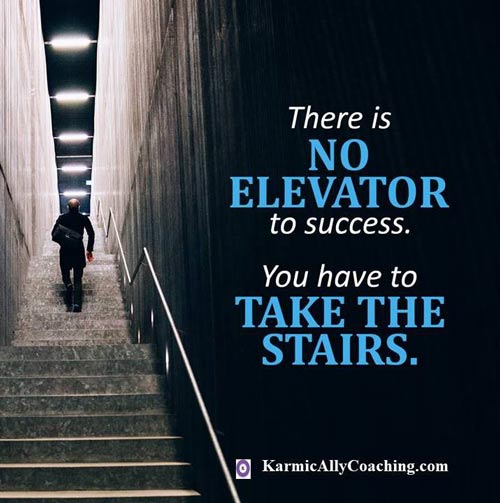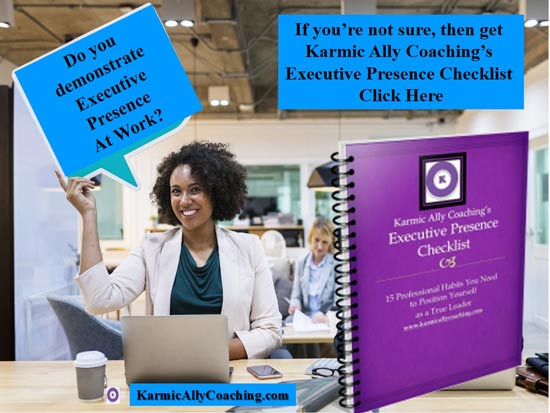This post has already been read 2857 times!

More often than not, the one area of help my clients ask for is for raising their visibility in the workplace and getting those meaty projects that could fast track their climb up the corporate ladder.
Part of the solution is raising their Executive Presence but if you want to stand out from the crowd or competition at work, then you need to be seen as an expert in your field.
This takes action on your part and not just walking around telling people that you’re an expert.
For sure, if you’ve got a professional qualification like being a CPA, people would consider you an expert compared to an accountant and yet during my corporate years, I have worked in companies where the person in the office who was perceived as The Expert didn’t have the qualifications!
This meant that colleagues were comfortable talking to them about their specific technical problems and had confidence in the non-CPA’s expertise and knowledge.
I’ve written about one of them, Rajesh, who was considered a walking encyclopedia in my post on Self-Esteem Buckets.

In other words, the real perception lies with the observer and not the expert. If people think or call you an expert, then you are the expert. You need to manage perceptions!
Tips for Finding Your Strengths and Developing Your Expertise
Believe it or not but each one of us is good at something. Expertise doesn’t necessarily require a college degree or professional qualification. It requires a passion for the topic and the willingness to learn.
For example, I have a mechanic who learned his craft under the apprenticeship of his father. When his father first started his business in Khan Market, he was into scooters and motor bikes and then graduated to vehicles.
His son is an expert now in imported cars and has taken the business further by setting up 2 workshops! I often go to him first for a diagnosis of my vehicle’s problem and take his advice before going to the authorized service dealer.
Your strength could be your oratory and motivational speaking or an artistic hand. The key is to figure out your strengths and become an expert at them.
How to Discover Your Expert Worthy Strengths

You can do your own assessment of what you think you’re good at and what you’re most comfortable doing. Here are a couple of ideas:
- Make a list. Think about all the responsibilities of your job and everything that’s expected of you. Now go through that list and put a star next to everything you excel at or enjoy doing. Don’t be modest; be honest with yourself!
- Study your list and meditate on your choices. Really focus your mind on the direction you want your career to take and which skills you need to sharpen to achieve your goals. Focus your attention on the skills that will immediately benefit you.

Discovering Your Strengths by asking others
The second way to discover your personal strengths is to talk to others. You may tend to believe you know what you’re good at, but when you talk to someone who sees you with fresh, unbiased eyes, you’ll get a completely different perspective.
- Don’t be afraid to approach your boss and ask him or her about your strengths. Be proactive! Take control of your career and take the necessary steps to improve your leadership skills and develop your expertise.
- Take additional training and development courses. Does your job or company offer any kind of continuing education programs? Are there training classes that sound interesting and pique your interest? Follow those instincts and register for the class to build upon the knowledge you already have.
Of course, you can ask your family and friends to characterize your strengths and weaknesses. They know you better than anyone else, so they’re more likely to be able to read between the lines and help you discover new things about yourself.
Chances are your friends and family won’t want to hurt your feelings by saying you’re no good at something, so instead, ask them to help you pick out your strengths. Or ask an open-ended question such as, “What jobs or skills do you think I have a talent for?”
Make sure you understand your family’s biases before making any big decisions.
How to Develop Your Expertise
Now that you’ve found your strengths, it’s time for you to bolster your expertise and become a true authority. This means you have to seek out opportunities to work on these skills.
For example, if speaking is your strength, consider taking a public speaking class at a local university to improve that skill. Take every opportunity to speak in front of groups, whether it’s a fundraiser, company meeting, giving a toast at a special event, or speaking to your child’s class.
Seek out the opportunities to practice your skill and take advantage of them. The goal is to find ways to get out of your comfort zone and challenge yourself to sharpen your skills.
How to create the impression you’re an authentic expert

Everyone has the potential to be an expert at what they do.
Here are a few simple steps that you’ll need to follow first to be recognized as an expert.
Educate Yourself on the subject of your planned expertise
Once you have developed the expertise in your chosen area you need to maintain that knowledge.
Expertise is another word for knowledge and the onus is on you to keep yourself up to date with information about your topic and if you are in a specialized field like law, accounting or information technology, make sure you’re up to date with the developments in those areas.
It’s not just reading though – you need to know what you’re talking about.
There are 2 ways you can enhance your knowledge:
- Take courses, attend workshops and even seminars to help further your education and keep you up to date on the latest knowledge and technology. If self-paced study is easier for you, look up courses on Udemy and other online learning platforms.
- Read more. It doesn’t matter what you do as a profession, you need to take advantage of the vast knowledge in the library.
That’s why certain professionals like accounting and law require their qualification holders to do a minimum number of hours of study each year to maintain their right to use the title that goes with that qualification.
Own Your Knowledge
By expanding your knowledge you’ll also build your confidence which in turn will give confidence to others that you know your stuff.
I mean, have you ever hear an expert stutter and stammer and say they’re not sure? Of course not! You’ll hear the confidence in their voice and see it in their body language.
Everyone is an expert at something. The problem is, we often don’t realize our own expertise and take it for granted. Some coaches refer to it as your super power while others talk about unique selling proposition or USP.
The key is to discover it and step into it. Think of some knowledge or activity that you find easy to do or perform where others struggle and you’re on to finding your golden gift.
Even then if you have an issue or find it challenging to be confident, take the help of affirmative statements to help your subconscious mind accept you are an expert.
Declare it to the world with your elevator pitch, your business cards and on your social media profiles.
Demonstrate Your Knowledge
It’s one thing to talk about what you know, but it’s something else entirely to actually apply it.
Experts don’t walk around showing off about what they can do; they prove it by taking action and demonstrating their expertise by solving difficult problems and finding viable solutions.
In other words, be proactive in your approach. Sometimes we don’t know the answer but we do know someone who does. Reach out to that other expert to help find the solution.
A true expert is always willing to learn new things and isn’t afraid to admit that they might not have the ideal solution and need help too. They also act with integrity.
Always Act With Integrity
Demonstrating knowledge isn’t the only thing experts do. They possess qualities of ethics, integrity and teaching. This means avoiding shortcuts and taking credit for things you haven’t done.
Skipping out on doing something the right way doesn’t make you an expert, however, this doesn’t mean that you have to do everything yourself.
There will always be things we’re not so good at. In those circumstances, you have to learn how to delegate those responsibilities to others who have the skills required to get the job done.
Part of being a good expert is seeing the strengths and weaknesses of others and how their talents can be put to good use.
You can and should delegate tasks where required and teach your team using hands on approach.
Wise leaders and the most incredible of experts don’t do everything themselves. They have a talented team around them who have the skills they themselves lack.
Acknowledge your people for doing a good job and where there is scope for improvement, follow the golden rules for effective feedback.
This also raises your stature with your team and co-workers which in turn enhances your Executive Presence.
Learn the skill of Effective Communication
People have to understand what you can do and why you’re the best one to do it.
This means that you have to understand and foresee the questions and concerns of others, then prepare and articulate the answers and solutions to them.
I learned a lot about getting messages across from my furry family member Miss Coco during the time the Northern Grid had tripped leaving the entire North India region without electricity.
Pick up the effective communication tips from the canine here.
By following these simple steps you’ll become the person with the answers. These are the experts who become irreplaceable and well respected.
Do you convey the message of being an expert with your actions and words?




 I adhere to the Certified Coaches Alliance Code of Ethics and Standards. A copy is available on request.
I adhere to the Certified Coaches Alliance Code of Ethics and Standards. A copy is available on request.
 Let's Talk through the Connect Form:
Let's Talk through the Connect Form:
Thank you for this amazing post. It helped me realize how I can be seen as an expert in my field. I’ve been working on this for a while now and it gave me such clarity. Blessings and love
I love it when a blog post provides the right information for the reader at the right time, Debra. You are an expert in my eyes. Now its time to claim it!
You always have a way of inspiring me to ‘be’ more courageous and acknowledge my natural talents. I agree that taking action and learning new skills are more important than simply talking about what an expert we are in various aspects of life. Thank you for the pearls of wisdom. You gave me (us) a lot to ponder.
My pleasure Cindy. You are an expert, even if you haven’t claimed your title yet.
I’ve met many people over the years who had the right credentials to call themselves an expert, but whose integrity was highly in question. As far as I’m concerned, you can always learn how to do something, but without integrity it’s just a bunch of words. Integrity is my #1 priority.
Same here Barbara. If a highly credentialed person does not give me an impression of having high ethics and integrity, I won’t work with them and look for someone else who might not have those degrees but the right requirements to make me feel comfortable in their expertise and use of it.
Wow integrity has reared its head for me several times in the past week and had to raise my boundaries.
Love your ways to find your strengths and always good to ask as often how you see you is quite different from how you believe you to be
When we keep lower boundaries, the Universe makes sure there are events that require us to address it with a trigger that is important for us, and knowing you as well as I do, Integrity is your second name, Suzie.
Perception management is indeed a part of being seen as an expert.
Thank you for this post. There is lots to chew on and digest on how to not only define an expertise, but up the level of it. Great post.
Thanks Laura. I admit when I finished writing it, I felt it was a longer post but I simply had to share my view on becoming an expert and then maintaining that status. I guess when we are passionate about a topic, we forget word count. 🙂